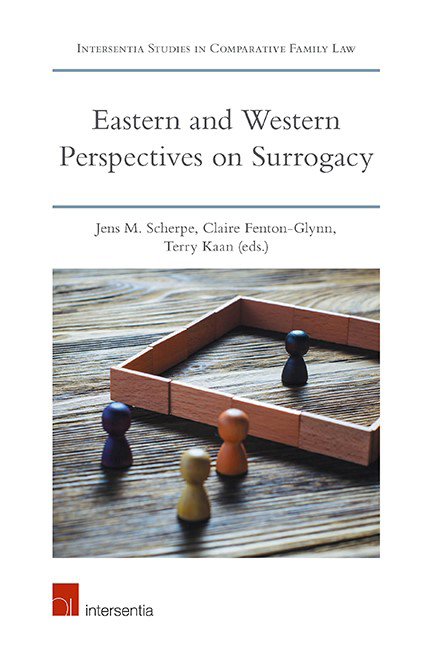Book contents
- Frontmatter
- Preface and Acknowledgements
- Contents
- List of Contributors
- Introduction
- Questionnaire
- PART I WESTERN PERSPECTIVES
- THE PROHIBITIVE APPROACH
- THE TOLERANT APPROACH
- THE REGULATORY APPROACH
- THE FREE MARKET APPROACH
- Russia
- United States of America
- THE INFLUENCE OF INTERNATIONAL COURTS
- PART II EASTERN PERSPECTIVES
- THE PROHIBITIVE APPROACH
- A TOLERANT APPROACH?
- REGULATION THROUGH PROFESSIONAL MEDICAL BODIES
- FROM FREE MARKET TO REGULATION
- PART III COMPARATIVE PERSPECTIVES ON SURROGACY
- Index
- About the Editors
United States of America
from THE FREE MARKET APPROACH
Published online by Cambridge University Press: 26 June 2019
- Frontmatter
- Preface and Acknowledgements
- Contents
- List of Contributors
- Introduction
- Questionnaire
- PART I WESTERN PERSPECTIVES
- THE PROHIBITIVE APPROACH
- THE TOLERANT APPROACH
- THE REGULATORY APPROACH
- THE FREE MARKET APPROACH
- Russia
- United States of America
- THE INFLUENCE OF INTERNATIONAL COURTS
- PART II EASTERN PERSPECTIVES
- THE PROHIBITIVE APPROACH
- A TOLERANT APPROACH?
- REGULATION THROUGH PROFESSIONAL MEDICAL BODIES
- FROM FREE MARKET TO REGULATION
- PART III COMPARATIVE PERSPECTIVES ON SURROGACY
- Index
- About the Editors
Summary
AN OVERVIEW OF SURROGACY ACROSS THE UNITED STATES
INTRODUCTION
In the United States, the law of surrogacy reflects a combination of state law, with the majority of states having adopted no direct legislation or definitive appellate precedents; and private law, with contracts of uncertain enforceability shaping the courts ‘and the parties’ expectations about the outcomes in the event of a dispute. While this creates substantial uncertainty about surrogacy law, the states that enjoy the most robust surrogacy practices do have comprehensive legal standards, and jurisdiction shopping within the United States is relatively easy to do. In addition, established commercial agencies, which draft standardised contracts, develop practices that set industry norms. As a result, American surrogacy law is more robust than a review of statutes and reported decisions might suggest.
Surrogacy law in the United States has developed in the context of a federal system, which entrusts family law, the licensing of medical professionals, and private contract law to the individual states. At the federal level, Congress has some power to address surrogacy on a national basis, but it has not chosen to exercise it. The states are therefore free to adopt their own approaches to the legality of surrogacy and to the determination of the children ‘s parents. In the majority of the states that lack explicit statutes on surrogacy, however, many courts have yet to address surrogacy at all or have done so only in decisions that do not constitute binding precedent. Complicating matters further, commissioning parents who live in a jurisdiction that prohibits surrogacy may contract with a surrogate in another state where such contracts are enforceable, and the determination of parentage may then depend on the child’ s residence at the time of the order (typically the state where the surrogate gives birth). The US Constitution then requires that other states accord ‘full faith and credit’ to the parentage judgments. The states are similarly free to regulate international surrogacy arrangements on whatever terms they choose; the fact that the commissioning parents come from outside the United States does not affect state power to determine parentage or the validity of contracts.
- Type
- Chapter
- Information
- Eastern and Western Perspectives on Surrogacy , pp. 307 - 328Publisher: IntersentiaPrint publication year: 2019
- 2
- Cited by



